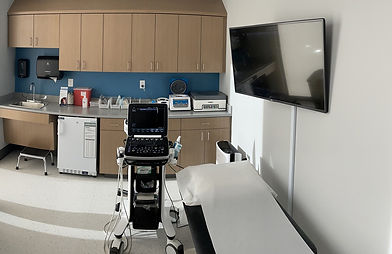Frozen Shoulder
Frozen shoulder, also called adhesive capsulitis, is a condition characterized by pain and loss of motion in the shoulder joint. It is more common in older adults between the ages of 40 and 60 years and is more common in women than men. Frozen shoulder may cause pain, stiffness, and limit the movements of the shoulder.
What Can Cause Frozen Shoulder?
Frozen shoulder is caused by the inflammation of the ligaments holding the shoulder bones to each other. The shoulder capsule becomes thick and tight, and stiff bands of tissue called adhesions may develop. Individuals with a shoulder injury, who've experienced shoulder surgery, have had their shoulder immobilized for a long period of time, as well as individuals with other conditions, are at risk of developing frozen shoulder.
What is Ultrasound Guided Hydrodialation?
Hydrodilatation (also called capsular distension) is a minimally invasive procedure used to treat adhesive capsulitis (“frozen shoulder”) by injecting a mixture of saline, local anesthetic, and often corticosteroid directly into the glenohumeral joint under ultrasound or fluoroscopic guidance. The large-volume fluid injection gently stretches and disrupts the tight, fibrotic joint capsule, improving mobility and reducing pain. Patients typically experience rapid gains in range of motion—often immediately—with continued improvement when combined with physical therapy. It is a safe, clinic-based intervention that offers an alternative to more invasive options like manipulation under anesthesia or arthroscopic release.
**Insurance does not cover ultrasound guided hydrodialation.


TREATMENT OPTIONS FOR FROZEN SHOULDER
As with most orthopedic conditions, patients will often begin with a combination of physical therapy, anti-inflammatories, ice and rest (and in some cases, steroid injections).
When these methods are no longer effective, Carolina Nonsurgical Orthopedics offers the latest in cutting-edge treatments to reduce pain and get you back to the activities you enjoy. Some of these innovative alternatives to surgery include Orthobiologics and Regenerative Medicine treatments, such as:
-
Platelet-Rich Plasma (PRP) Injections: Use your own platelets to reduce inflammation and accelerate healing.
-
Prolotherapy: Uses dextrose (sugar water) in place of steroid to reduce pain and promote healing.
-
Shockwave: A non-invasive therapy that uses impulses to treat chronic pain and repair tissue.
-
Hydrodialation of the capsule: Using more volume than usual we can target the joint with the ultrasound and "distend" the capsule with saline. This can sometimes free the capsule up more than a steroid injection.
See the full list of conditions and treatments offered at Carolina Nonsurgical Orthopedics.
READ MORE ABOUT FROZEN SHOULDER
Frozen shoulder can be diagnosed by the presenting symptoms, and radiological diagnostic procedures such as X-rays or MRI scans. Individuals with conditions such as diabetes, hypothyroidism, hyperthyroidism, Parkinson’s disease, and cardiac diseases, a shoulder injury, previous shoulder surgery, or if you have had your shoulder immobilized for a long period of time, are at risk of developing frozen shoulder.


WHY CAROLINA
NONSURGICAL ORTHOPEDICS
-
All Providers are BOARD CERTIFIED and Specially Trained in Nonsurgical Orthopedics
-
Over 50,000+ and Counting Procedures Performed
-
Procedures Performed with Ultrasound Guidance for Accuracy and Safety
-
Local and Independent Practice That is NOT a Franchise
-
Discounts for Service Members, Teachers, and Public Servants
-
Serving Raleigh Since 2013
.png)
